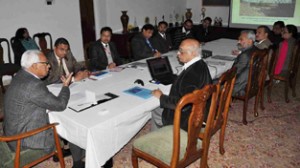Excelsior Correspondent

JAMMU, Dec 8: Earlier this year, consequent to discussions between Governor N.N. Vohra and Dr. R. Chidambaram, Principal Scientific Adviser to Government of India, the Governor had addressed all the Vice Chancellors in the State to moot suitable proposals which could be taken up for implementation with the support of the Rural Technology Action Group (RuTAG) which is guided and advised by the collegium of all the IITs in India and the Institute of Science, Bangalore, functioning under the overall care of Dr. Chidambaram.
The Universities of Jammu, Kashmir, Baba Ghulam Shah Badshah, Sher-e-Kashmir University of Agricultural Sciences and Technology – Kashmir, Shri Mata Vaishno Devi Shrine Board and several NGOs responded and proposed 22 projects for implementation under the aegis of RuTAG.
After discussion between the Governor and Dr Chidambaram, all these proposals were discussed in a 2-day meeting organized here by University of Jammu recently. On behalf of RuTAG the meeting was attended by Prof S.K. Saha of IIT Delhi, Prof S.P. Kimothi, ADG, ICAR; Dr S. Chatterjee, Scientific Consultant and Dr Ketaki Bapat, both of whom represented the Principal Scientific Adviser, Government of India.
The others who attended the meeting included Prof R.D. Sharma, Vice Chancellor, University of Jammu, Prof Khurshid Andrabi, Vice Chancellor, University of Kashmir, Prof. Tej Pratap, Vice Chancellor, Sher-e-Kashmir University of Agricultural Sciences and Technology – Kashmir, Prof I.A. Hamal, Vice Chancellor, Baba Ghulam Shah Badshah University, Dr M.K. Bhandari, CEO, Shri Mata Vaishno Devi Shrine Board and the Principal Secretary to Governor, R.K. Gupta, among others.
The recommendations emerging from the 2-day consultations were discussed in a two hour meeting at the Raj Bhavan here this morning. Besides discussions on the proposals and decisions regarding the further course of action Dr R. Chidambaram spoke on “The Path to a Knowledge Driven Economy – Advanced Technology in Rural Development”.
In his presentation, Dr Chidambaram highlighted the objectives of RuTAG, which had been conceptualised by a team under his guidance, and emphasised the high importance of launching innovative projects and promoting the application of science and technology for the resolution of problems faced in the day to day living and working lives of the rural communities residing in the various parts of J&K.
A very important decision taken in the meeting was to set up RuTAG Chapter in the University of Jammu, to function with the strong support of IIT Delhi, under the overall watch of Dr Chidambaram.
Governor, who is Chancellor of six Universities in the State, reiterated the importance of early establishing collaborative linkages not only among the institutions of higher learning and research within the State but also with academic and research bodies all over the country and abroad.
He noted that such collaborative arrangements and networking arrangements will provide immensely beneficial opportunities for enhancing research and innovative solutions of varied problems. The Governor observed that an e-class room will soon be set up by the Shri Mata Vaishno Devi University. Dr Chidambaram urged the Universities in J&K to link up with the Centres of Excellence in Nano Electronics and with Indian Nano Electronics User Programme and for early steps being taken to avail the enormous benefits available from the National Knowledge Network.
Late, Dr. R. Chidambaram, visited the 4-ton per day capacity mule-dung based Bio-Gas Plant established by the Shrine Board at Banganga, Katra and took stock of this initiative taken by the Shrine Board.
Dr. M.K. Bhandari, Chief Executive Officer, SMVDSB, who accompanied Dr Chidambaram briefed him about the efforts made by the Shrine Board towards preserving the environment, including the initiative taken to undertake large scale plantation of trees, setting up solar water heating systems and solar power plants, setting up of automated nurseries and vermin-compost units, use of bio-digester technology developed by DRDO for sewage treatment, implementation of rain water harvesting systems, among others.
Dr Chidambaram appreciated the efforts made by the Shrine Board and stressed the need for carrying forward these initiatives, apart from bringing into play new scientific interventions for further improving the functional efficiencies in various fields.
Later, he interacted with the officers of the Shrine Board and advised on the need to make efforts for exploring possibilities of collecting mule dung at source in order to enable its better disposal. Various methods of non-biodegradable waste disposal, including poly-crack technology, use of Rural Technology Action Group (RuTAG) for improving scientific interventions etc. were discussed during the interaction.
Dr. M. K. Kumar, Additional Chief Executive Officer, B. Mohandaas, Deputy Chief Executive Officer, and Dr. Gopal Sharma, Deputy Divisional Manager of the Shrine Board were among those present during the interaction.

